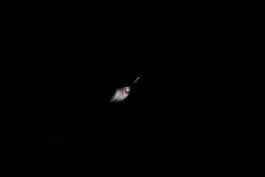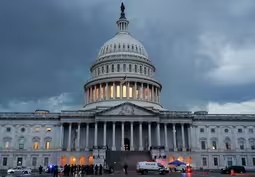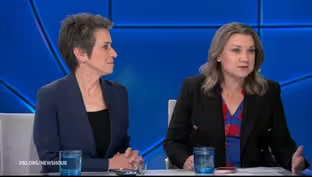
Retired U.S. vice admiral analyzes Iran conflict
Clip: 6/23/2025 | 6m 50sVideo has Closed Captions
Retired U.S. vice admiral analyzes Iran conflict and what's next
For analysis of the U.S. strikes on Iran's nuclear sites and Tehran's response, Geoff Bennett spoke with retired Vice Admiral Kevin Donegan. He commanded the U.S. 5th Fleet based in Bahrain and is now a distinguished military fellow at the Middle East Institute.
Problems playing video? | Closed Captioning Feedback
Problems playing video? | Closed Captioning Feedback
Major corporate funding for the PBS News Hour is provided by BDO, BNSF, Consumer Cellular, American Cruise Lines, and Raymond James. Funding for the PBS NewsHour Weekend is provided by...

Retired U.S. vice admiral analyzes Iran conflict
Clip: 6/23/2025 | 6m 50sVideo has Closed Captions
For analysis of the U.S. strikes on Iran's nuclear sites and Tehran's response, Geoff Bennett spoke with retired Vice Admiral Kevin Donegan. He commanded the U.S. 5th Fleet based in Bahrain and is now a distinguished military fellow at the Middle East Institute.
Problems playing video? | Closed Captioning Feedback
How to Watch PBS News Hour
PBS News Hour is available to stream on pbs.org and the free PBS App, available on iPhone, Apple TV, Android TV, Android smartphones, Amazon Fire TV, Amazon Fire Tablet, Roku, Samsung Smart TV, and Vizio.
Providing Support for PBS.org
Learn Moreabout PBS online sponsorshipGEOFF BENNETT: And, for analysis, we're joined now by retired Vice Admiral Kevin Donegan.
He commanded the U.S. Fifth Fleet, which is based in Bahrain.
He's now a distinguished military fellow at the Middle East Institute.
Thank you for joining us.
I want to start with your reaction to President Trump posting on social media this evening what he called a complete and total cease-fire between Israel and Iran.
VICE ADM. KEVIN DONEGAN (RET.
), Former Commander, U.S. Navy Fifth Fleet: Yes, so for those of us that -- around the world that look hard at the Middle East, there's one certainty, and that's that we're going to be surprised.
We were surprised at the way that Israel started this and when they started it.
We were surprised at the way that the U.S. entered this.
And now we're surprised again here, because this is just a few hours after this retaliatory strike on Al Udeid.
We now have this announced cease-fire.
And I think it's a good thing.
Any time you can get a conflict to pause and have a cease-fire, it prevents an opportunity.
So now the question, as Nick was clearly laying out, is, can we take advantage of that opportunity?
I want to add one more piece.
It's a different Iran now than it was before this started.
Its IRGC is weakened.
Their -- its nuclear capability is degraded, to the extent that it'll be determined in time.
And, as a result, the regime is somewhat weakened from where it was before.
So, when you add that to the fact that Syria is now no longer an ally of them, that Hezbollah has been decimated, that Hamas has been destroyed, and the Houthis are weakened, you can see that this -- the opportunity for maybe a potential change in the Iranian stance is out there, but time's going to tell.
GEOFF BENNETT: Well, on that point, I mean, who is calling the shots in Tehran right now, given the fact that their senior military leadership was decimated?
I mean, what does all of this say about their command, control capacity?
VICE ADM. KEVIN DONEGAN (RET.
): Well, first, I think we know who's calling the shots, and it's the supreme leader, of course.
He's setting the tone for how they're going to act, and the replacements will come in with his tone and tenor, right?
But they are coming in.
And the reason that they're weakened is because it's hard for them to know who to talk to, how to talk to, because they don't know who's listening and what the Israelis were going to do.
But -- so their main action arm is weakened, and that is -- therefore, that overall weakens their military and overall weakens the regime, to some extent, which -- like I said.
But perhaps this is an opportunity.
So who's calling the shots is the supreme leader.
GEOFF BENNETT: And what was the message that Iran intended to send with its retaliatory strikes?
VICE ADM. KEVIN DONEGAN (RET.
): I think the message they sent was the one that we all read into it right away.
They didn't attack to the level that we -- they could have.
They could have gone wider with the bases they have attacked.
They could have attacked bases like the Fifth Fleet headquarters and other places that are around population centers, but, instead, they chose to attack Al Udeid, which is relatively isolated.
There's no other population out there.
And they didn't -- and that barrage was able to be defeated.
In other words, they set up a symbolic attack against the U.S. that they knew would be blunted and repelled.
And that, I think, was to affirm to President Trump and the Israelis, especially, though, President Trump, that they are ready to negotiate.
Now, we're going to see, because it's very complex in terms of, we don't know where they stand on that red line related to enrichment.
GEOFF BENNETT: When the vice president, J.D.
Vance, said today in an interview that Iran's stockpile is buried, what does that mean in a real sense?
I mean, what's your assessment of just how degraded, destroyed, and set back Iran's nuclear program is?
VICE ADM. KEVIN DONEGAN (RET.
): Well, first, we know that the attack on Fordow was successful.
We even heard the U.N. make that assessment.
And you have to give tremendous credit to those that were all involved in that operation to get into Fordow, because that was one of the things that the Israelis had on their list as a must-do.
They believed this operation wouldn't be successful, and they were vocal about it, unless they were able to get it for Fordow, and they did.
What hasn't been covered in great detail and we will maybe learn in the coming days is how much of the rest of the nuclear targets that the Israelis had on their list did they get degraded to the amount that they wanted to.
I would suspect that they serviced them to the level that they wanted to, or they wouldn't be offering up or agreeing to stopping at this point.
So -- but time will tell on that.
And as for the president -- the vice president's remarks, I think they stand for themselves.
GEOFF BENNETT: Well, the president having announced this total cease-fire, we will see if this cease-fire is lasting.
But what's the path back at this point to the negotiating table?
VICE ADM. KEVIN DONEGAN (RET.
): Well, so now the good news is that we have a path for how to negotiate with Iran.
For years, we didn't have that path, and we have already now had negotiations that were direct between the United States and Iran.
And that's what we all want to look for is -- just before the United States got involved in this attack, there was a planned meeting again between both sides in Oman, and that got canceled.
It was on Sunday.
And so my expectation is that it'll get right back on the table very quickly, and then we will find out pretty quickly where both sides stands in terms of those major issues we just talked about.
GEOFF BENNETT: You have been involved throughout your career in a lot of planning for war with Iran.
Did any of those scenarios for which you prepared have these many turns, these kinds of turns?
VICE ADM. KEVIN DONEGAN (RET.
): You know, the one thing I have learned in 38 years of dealing with military operations is, every plan you make fails at first contact with the enemy and first contact of putting it into execution.
So the value that you put into your plan is in getting everyone to be aligned into what they need to achieve, so, as things change, they can adjust.
And, actually, you saw some of that with the Israelis.
As opportunity presented itself to get at other targets, they took those opportunities.
And it wasn't a sure thing that the U.S. would get involved to finish off Fordow.
So I'm sure the Israelis had other options to do that.
We saw some of them come to fruition today, where they denied access to Fordow after the attack.
So, to me, the classic military operation is that the plan isn't going to be the one that ends up being executed, but the plan is what aligns everyone and enables them the flexibility to adjust as things change in the operation.
GEOFF BENNETT: Retired Vice Admiral Kevin Donegan now with the Middle East Institute, thanks for your time this evening, sir.
We deeply appreciate it.
VICE ADM. KEVIN DONEGAN (RET.
): Thanks, Geoff.
How Iran's response to U.S. signaled a desire to de-escalate
Video has Closed Captions
Clip: 6/23/2025 | 7m 35s | How Iran's response to U.S. strikes signaled a desire to de-escalate (7m 35s)
Murkowski on new memoir and adapting to Trump era politics
Video has Closed Captions
Clip: 6/23/2025 | 9m 22s | Sen. Murkowski on new memoir 'Far From Home' and adapting to Trump era politics (9m 22s)
News Wrap: Supreme Court allows deportations amid appeals
Video has Closed Captions
Clip: 6/23/2025 | 6m 12s | News Wrap: Supreme Court allows deportations of migrants to countries other than their own (6m 12s)
NYC mayoral primary could forecast the future for Democrats
Video has Closed Captions
Clip: 6/23/2025 | 8m 29s | New York City mayoral primary could forecast the future for Democrats (8m 29s)
Some Republicans clash with Trump over Iran strikes
Video has Closed Captions
Clip: 6/23/2025 | 4m 37s | Some Republicans in Congress clash with Trump over Iran strikes (4m 37s)
Tamara Keith and Amy Walter on impact of conflict with Iran
Video has Closed Captions
Clip: 6/23/2025 | 9m 15s | Tamara Keith and Amy Walter on the political impact of the conflict with Iran (9m 15s)
Providing Support for PBS.org
Learn Moreabout PBS online sponsorshipSupport for PBS provided by:
Major corporate funding for the PBS News Hour is provided by BDO, BNSF, Consumer Cellular, American Cruise Lines, and Raymond James. Funding for the PBS NewsHour Weekend is provided by...

















